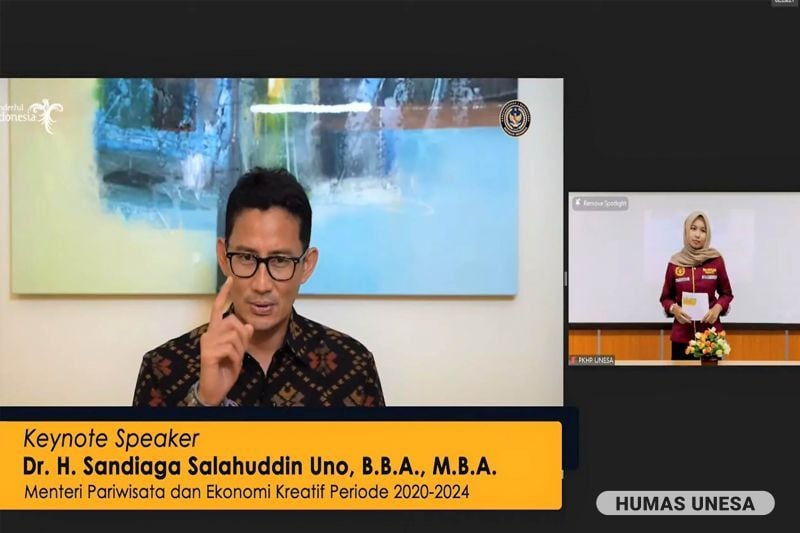
www.unesa.ac.id
Unesa.ac.id, SURABAYA-The Center for Legal Studies and Development of the State University of Surabaya (PKHP UNESA) held a webinar on Strategy to Generate the Tourism Economy: Law and Economic Dynamics on Tuesday, December 21, 2021. On that occasion, as a keynote speaker, the Minister of Tourism and Creative Economy of the Republic of Indonesia (Menparekraf RI), Dr. Sandiaga Salahuddin Uno, B.B.A., M.B.A.
Sandiaga Uno said that the pandemic that lasted for the past 2 years had a significant impact on various sectors, including the tourism sector and the creative economy (parekraf). The impact includes a decrease in the number of domestic and foreign tourists. The decline in the number of gross domestic product (GDP) and foreign exchange resulted in a decrease in the workforce in the tourism sector.
The pandemic has also changed a lot of things. In the parekraf sector there are at least three changes called 3A; attractions, amenities and accessibility. These changes forced the formation of a new concept of creative tourism which emphasizes more on H3L; hygiene, low touch, low mobility and less crowd.
That's one of the reasons why the Minister of Tourism and Creative Economy made the CHSE certification policy; Cleanliness or cleanliness, Health or Health, Safety or security, and Environment Sustainability or environmental sustainability. CHSE is applied in the business world and the creative economy to provide security and comfort for domestic and foreign tourism.
In order to revive the tourism and creative economy sector which had been affected, various targeted, timely and appropriate benefits have been pursued, such as increasing human resource capacity, revitalizing tourism destinations and creative economy intrastructures, increasing business resilience and competitiveness, product and service innovation, market recovery and expansion. , and accelerate vaccination programs in various destinations and creative economy centers.
On that occasion, Sandiaga Uno invited all to remain optimistic and continue to innovate, adapt and collaborate to jointly accelerate the national economic recovery. He hopes that the event will run smoothly and will help increase participants and the public's understanding of strategies to revive the tourism economy, which focuses on legal and economic dynamics. "The pandemic is not over yet, let's continue to be disciplined in our work, rise in difficult times, win against Covid, together yes we can do it," he concluded enthusiastically.
Meanwhile, PKHP senior researcher, Budi Harmono, S.H., M.H., who read the speech of the PKHP chairman, stated that the tourism economy was the first sector to be hit by the pandemic. As it has affected the economy and society of many people, places and businesses on a broader scale, some experts expect the tourism sector to be the last to recover after the pandemic.
Nevertheless, the pandemic must be an opportunity to rethink Indonesia's tourism economic strategy that is built sustainably in the short, medium and long term so that it can survive during a pandemic or crisis and be able to encourage transformative innovation towards industrial and business changes.
Current conditions require a balance between flexibility, regulatory innovation, and economic and social development. The law should integrate the objectives of economic and social development so that various parties are able to gradually adapt to the new normal.
Innovation and flexibility in legislation will be critical in overcoming the crisis and building national resilience. New approaches to law will be increasingly important in the future and it is necessary to seek innovative approaches that are aligned with economic and social development that will enable countries to respond to changing circumstances and move forward collectively.
As a webinar speaker, several experts from various universities were present; Prof. Dr. Ni Ketut Supasti Dharmawan, S.H., M.H., LL.M., Professor of Law at Udayana University; Prof. Dr. Ellydar Chaidir, S.H., M.Hum., Professor of Constitutional Law at the Islamic University of Riau; Prof. Dr. Adi Difficultiyono, S.H., M.H., Professor of Economics at Sebelas Maret University; and Dr. Bayu Dwi Anggono, S.H., M.H., Dean of the Faculty of Law, University of Jember. The speakers were guided by Elisabeth Septin Puspoayu, S.H., M.h., a UNESA Lecturer and Friska Dwi Oktafiana, a UNESA PKH Young Researcher as the host. [UNESA PR]
Reporters: Mohammad Dian Purnama and Reyka Ayu Kartikasari
Editor: @zam*
Share It On:






